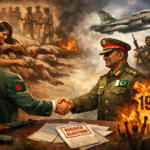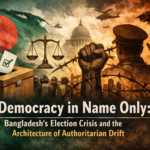A Rebirth in the Shadows of Zia
When Bangladesh achieved independence in 1971, Jamaat-e-Islami (JeI) was widely condemned for its collaboration with Pakistan’s military and the horrific atrocities of the war. Yet, remarkably, just five years later, under President Ziaur Rahman, JeI was welcomed back from the political wilderness. Zia’s military regime not only allowed JeI’s rebirth but also also nurtured its ambitions as a valuable Islamist ally. It was a marriage of convenience: BNP offered JeI legitimacy and protection, and in return, JeI bolstered BNP’s claim to religious nationalism.
16 Years of Hand-in-Glove Politics
From the late 1970s through the 1990s, JeI and BNP forged a formidable alliance. JeI provided BNP with an Islamist face—crucial for a party trying to position itself as both nationalist and religiously aligned. In the 1991 election, engineered by the military to keep secular, pro-liberation forces at bay, the BNP’s victory was secured in part through JeI’s support. JeI, in turn, was rewarded with ministerial posts and parliamentary clout, despite lacking a significant mass base of its own.
For 16 years, this alliance defined Bangladeshi politics. BNP offered JeI access to power and state resources, and JeI offered ideological cover, helping BNP blunt the secular message of the Awami League and dominate the national stage.
Cracks in the Alliance
But as Bangladesh’s politics shifted in the 2000s and 2010s, the glue that held this alliance together began to dry. BNP’s credibility waned amid corruption scandals and growing public disillusionment. JeI, meanwhile, faced existential challenges: its electoral base was shrinking, and it found itself squeezed between an assertive AL and a faltering BNP.
The final blow came after the political convulsions of 2024. With the Awami League sidelined and new actors jockeying for influence, JeI sensed an opportunity to stand on its own feet. Instead of remaining a junior partner to a diminished BNP, it began exploring new alliances that could give it a fresh lease on life.
Why is Jamaat Shunning BNP Now?
JeI’s decision to abandon BNP isn’t simply opportunism—it’s also a calculated response to shifting power dynamics in Bangladesh:
JeI’s fear of sinking with BNP: BNP’s leadership is fragmented, and many of its long-time supporters see it as a spent force. JeI believes that staying tied to BNP could drag it down into irrelevance.
A bid for ideological independence: Jamaat wants to shake off the perception that it is merely a pawn of BNP. It sees itself as the authentic voice of Islamist politics in Bangladesh, not a subsidiary of a nationalist party that has repeatedly betrayed its own promises.
Strategic realignment: By breaking from BNP, JeI hopes to rebrand itself as an independent actor that can form alliances across a broader Islamist and even global financial network, no longer shackled to BNP’s legacy.
The HuT Factor: Is a Third Player Behind the Split?
Some political observers suspect that the Islamist group Hizb ut-Tahrir (HuT), which operates within Bangladesh’s conservative circles, has played a role in this realignment. HuT has long opposed both BNP and the Awami League, seeing them as corrupt and compromised by Western interests.
By encouraging JeI to cut ties with BNP, HuT could be positioning itself to shape a new, more radical Islamist bloc. JeI’s recent rhetoric—emphasising a purer, less compromised form of Islamist governance—bears traces of HuT’s ideological influence. Whether HuT’s fingerprints are directly on this split remains unproven, but its narrative of rejecting the “old order” has indeed found sympathetic ears within JeI’s leadership.
Is Yunus’s Microfinance Empire a Conduit?
Adding another layer of intrigue is JeI’s unexpected pivot toward microloan networks and the so-called “friends of US democracy,” many of whom are linked to Nobel laureate Muhammad Yunus’s microfinance legacy. At first glance, this alliance seems strange: JeI’s Islamist platform doesn’t sit naturally with Yunus’s globalist microcredit capitalism.
But beneath the surface, there are shared interests:
Control of economic levers: JeI sees microfinance networks as a means to control economic lifelines—especially in rural Bangladesh, where access to credit can make or break political loyalties.
Expanding influence: Microfinance’s reach into every village offers JeI an opportunity to build a parallel grassroots infrastructure, tapping into economic dependency to grow its political base.
International legitimacy: By associating with Yunus’s global brand, JeI can launder its image internationally, masking its Islamist core with a sheen of progressive, market-friendly development.
Some critics argue that Yunus himself—wittingly or not—has become a conduit for these Islamist ambitions. His emphasis on financial inclusion and self-reliance can be easily co-opted by Islamist forces seeking to weave microfinance’s economic power with religious conservatism. For JeI, this is a perfect storm: the tools of Western development, repurposed to fuel a distinctly Islamist political vision.
A Final Betrayal?
For BNP, JeI’s abandonment is a bitter pill to swallow. It was BNP that rehabilitated JeI in the first place, granting it legitimacy when the wounds of 1971 were still fresh. Now, JeI is not just walking away—it’s actively undermining BNP’s last hold on Islamist politics.
BNP leaders see this as a betrayal of the highest order. Decades of shared power and patronage have been swept aside as JeI chases new, shinier partners—whether in the microloan world or the ideological cloisters of HuT.
What’s Next?
JeI’s departure leaves BNP adrift, with no Islamist partner to lend it credibility in the eyes of conservative voters. Meanwhile, JeI is gambling that it can forge a new path—one that combines Islamist rhetoric, economic populism, and new alliances with both domestic and global players.
This is more than a simple divorce—it’s the rewriting of Bangladesh’s political map. The old alliances are gone, and in their place, new forces are rising. Will JeI’s gamble pay off? Or will this be yet another chapter in Bangladesh’s long history of opportunistic alliances that collapse under the weight of their contradictions?
One thing is sure: Jamaat’s decision to dump BNP is a betrayal for the ages—and a stark reminder that in politics, there are no permanent friends, only permanent interests.






